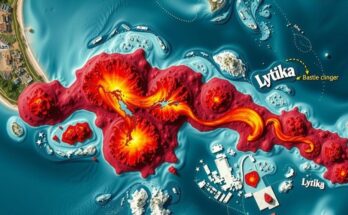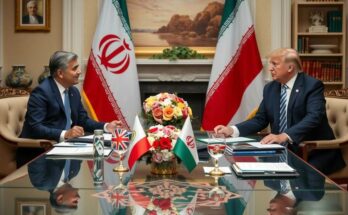Iran has reacted to advances by Syrian opposition groups, particularly HTS, claiming that the US and Israel are conspiring to destabilize Syria. Foreign Minister Abbas Araghchi asserts this coordination is evident in the timing of recent attacks, especially following a ceasefire in Lebanon. Iran’s aim is to consolidate support for the Assad regime while seeking to expel US forces in eastern Syria.
In late November, Iran expressed alarm over the rapid gains made by Syrian opposition factions, particularly Hayat Tahrir al-Sham (HTS), who successfully captured territories from Syrian government forces, including Aleppo. Following this, HTS made advances towards Hama but has since stalled. In response, Iran has indicated its intent to rally support for the Syrian regime, alleging that a coalition involving Israel and the United States is behind these escalations.
Iran’s Foreign Minister Abbas Araghchi articulated this perspective during a television interview, asserting, “There is complete coordination between the Zionist regime, the US government, and terrorist groups, and the course of events indicates such coordination…” He suggested that the timing of the HTS assault was orchestrated in connection to a ceasefire in Lebanon, ultimately intended to undermine stability in Syria.
The Iranian assertion rests on claims that the recent successes of HTS have connections to the ongoing conflict involving Hezbollah, a proxy of Iran, and its confrontation with Israel. Despite Iran’s claims, there is a lack of evidence suggesting that the US or Israel supports HTS’s military endeavors. Conversely, Israel appears concerned that instability within Syria could create an environment ripe for Iranian proxies to increase their influence and launch attacks.
Additionally, Iran seeks to leverage this situation to gather support from Turkey and Russia, especially as it aims to dislodge US forces stationed in eastern Syria combating ISIS alongside Kurdish groups. In this political climate, Turkey has shown solidarity with Iran’s perspective by mobilizing factions to counter Kurdish influences in the region.
Furthermore, Araghchi emphasized the unwavering support of Iran for the Assad regime, reflecting on discussions with Syrian President Bashar al-Assad, and underscoring a renewed commitment to the Astana process that seeks to stabilize the region through collaboration with Russia and Turkey.
The analysis of Iran’s assertions regarding the US and Israel’s involvement in the Syrian conflict comes against a backdrop of escalating tensions within the region. Iranian forces and their ally, the Syrian government, have long been engaged in efforts to suppress opposition groups, particularly during significant military offensives. The recent gains by HTS have shifted the balance, prompting Iranian officials to seek alliances that reaffirm their commitment to the Assad regime while simultaneously denouncing external interventions perceived as disruptive to Syrian sovereignty.
In summary, Iran’s rhetoric linking the US and Israel to the escalations in Syria reveals a strategic narrative aimed at consolidating support for its regional allies while justifying its military presence. While Iran alleges coordinated attacks against the Syrian government, the actual impact of these claims on the ground remains to be seen, as both Turkey and Russia continue to factor into the complex geopolitical calculations within Syria.
Original Source: www.jpost.com




